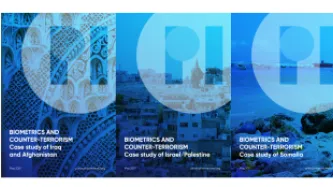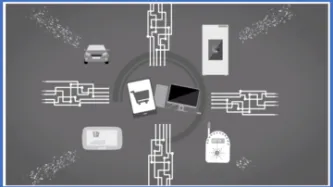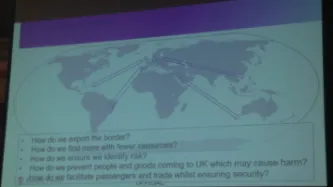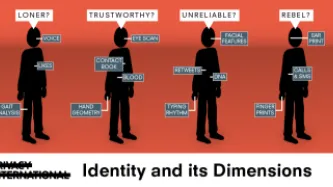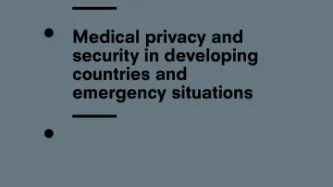Search
Content type: Long Read
The global COVID-19 health crisis not only induced a public health crisis, but has led to severe social, economic and educational crises which have laid bare any pre-existing gaps in social protection policies and frameworks. Measures identified as necessary for an effective public health response such as lockdowns have impacted billions workers and people's ability to sustain their livelihood worldwide, with countries seeing unprecedented levels of applications for welfare benefits support,…
Content type: Long Read
When you buy a brand-new low-cost phone, it’s likely to come pre-installed with insecure apps and an outdated operating system. What this means is that you or your loved ones could be left vulnerable to security risks or to having their data exploited. Privacy shouldn’t be a luxury. That’s why we advocate for companies to provide the latest security features and privacy protections for both low- and high-cost phones.
Content type: Long Read
For many, browsing the internet or checking social media comes with its fair share of being targeted with ads selling “fad diet” subscription-based programmes, magic weight-loss powders, or promising a secret trick to lose weight quickly. Some of the products and programmes sold have been described as scams, with a very real impact for those suffering from eating disorders and those who fall prey to these ads. This is even more problematic due to the Covid-19 pandemic, which has seen the…
Content type: Long Read
Since the September 11th attacks, decision makers across the globe have embraced overreaching surveillance technologies. The global “War on Terror” ushered in and normalized an array of invasive surveillance technologies. Collection and storage of biometrics data and the application of statistical methods to such data have been touted as uniquely suited to twenty-first century threats. Yet, biometrics technologies are not seamless, panoptic technologies that allow for perfect control. They can…
Content type: Report
It is common for families with no recourse to public funds who attempt to access support from local authorities to have their social media monitored as part of a 'Child in Need' assessment. This practice appears to be part of a proactive strategy on the part of local authorities to discredit vulnerable families in order to refuse support. In our experience, information on social media accounts is often wildly misinterpreted by local authorities who make serious and unfounded allegations…
Content type: Long Read
Miguel Morachimo, Executive Director of Hiperderecho. Hiperderecho is a non-profit Peruvian organisation dedicated to facilitating public understanding and promoting respect for rights and freedoms in digital environments.The original version of this article was published in Spanish on Hiperderecho's website.Where does our feeling of insecurity come from? As we walk around our cities, we are being observed by security cameras most of the time. Our daily movement, call logs, and internet…
Content type: Long Read
Content type: Long Read
Photo by David Werbrouck on Unsplash
This is an ongoing series about the ways in which those searching for abortion information and procedures are being traced and tracked online. This work is part of a broader programme of work aimed at safeguarding the dignity of people by challenging current power dynamics, and redefining our relationship with governments, companies, and within our own communities. As an enabling right, privacy plays an important role in supporting the exercise of…
Content type: Long Read
Everyday objects and devices that can connect to the Internet -- known as the Internet of Things (IoT) or connected devices -- play an increasing role in crime scenes and are a target for law enforcement. Exploiting new technologies that are in our homes and on our bodies as part of criminal investigations and for use as evidence, raises new challenges and risks that have not been sufficiently explored.
We believe that a discussion on the exploitation of IoT by law enforcement would…
Content type: Long Read
The UK border authority is using money ring-fenced for aid to train, finance, and provide equipment to foreign border control agencies in a bid to “export the border” to countries around the world.
Under the UK Border Force’s “Project Hunter”, the agency works with foreign security authorities to bolster their “border intelligence and targeting” capabilities with UK know-how and equipment.
As well as the provision of equipment and training, the Border Force is also advising countries on…
Content type: State of Privacy
Table of contents
Introduction
Right to Privacy
Communication Surveillance
Data Protection
Identification Schemes
Policies and Sectoral Initiatives
Introduction
Acknowledgement
The State of Privacy in Colombia is the result of an ongoing collaboration by Privacy International and Fundación Karisma and Dejusticia.
Key Privacy Facts
1. Constitutional privacy protection: The constitution contains an explicit protection of the right to privacy (Article 15 of the 1991 constitution).
2…
Content type: State of Privacy
Table of contents
Introduction
Right to Privacy
Data Protection
Identification Schemes
Policies and Sectoral Initiatives
Introduction
Acknowledgment
The State of Privacy in Pakistan is the result of an ongoing collaboration by Privacy International and the Digital Rights Foundation.
Between 2014-2016, Bytes for All contributed to previous versions of the 'Data Protection' sections of this briefing.
Key Privacy Facts
1. Constitutional privacy protections: Article 14(1) of…
Content type: State of Privacy
Table of contents
Introduction
Right to Privacy
Communication Surveillance
Data Protection
Identification Schemes
Policies and Sectoral Initiatives
Introduction
Acknowledgement
The State of Privacy in India is the result of an ongoing collaboration by Privacy International and the Centre for Internet & Society.
Key Privacy Facts
1. Constitutional privacy protections: In 2017, the Indian Supreme Court ruled that the Indian constitution guarantees a right to privacy.
2. Data…
Content type: Long Read
It’s 15:10 pm on April 18, 2018. I’m in the Privacy International office, reading a news story on the use of facial recognition in Thailand. On April 20, at 21:10, I clicked on a CNN Money Exclusive on my phone. At 11:45 on May 11, 2018, I read a story on USA Today about Facebook knowing when teen users are feeling insecure.
How do I know all of this? Because I asked an advertising company called Quantcast for all of the data they have about me.
Most people will have never heard of…
Content type: Long Read
The Sustainable Development Goals (SDGs) are the United Nations-led initiative to define the development agenda. Building on the eight Millennium Development Goals, the SDG’s 17 goals – and the 169 targets – serve as an opportunity to tackle many of the most pressing issues in the world today. The SDGs are also explicitly grounded in human rights. Goal 16 on “peace, justice, and sustainable institutions” aims to “Promote peaceful and inclusive societies for sustainable development, provide…
Content type: Long Read
Privacy International’s new report shows how countries with powerful security agencies are training, equipping, and directly financing foreign surveillance agencies. Driven by advances in technology, increased surveillance is both powered by and empowering rising authoritarianism globally, as well as attacks on democracy, peoples’ rights, and the rule of law.To ensure that surveillance powers used by governments are used to protect rather than endanger people, it is essential that the public,…
Content type: Report
Countries with powerful security agencies are spending literally billions to equip, finance and train security and surveillance agencies around the world — including authoritarian regimes. This is resulting in entrenched authoritarianism, further facilitation of abuse against people, and diversion of resources from long-term development programmes.
Privacy International's report 'Teach 'em to Phish: State Sponsors of Surveillance' examines this problem closely, providng examples from US, China…
Content type: Long Read
Privacy International (PI) has today released a new report, 'Teach 'em to Phish: State Sponsors of Surveillance', showing how countries with powerful security agencies are training, equipping, and directly financing foreign surveillance agencies.
Spurred by advances in technology, increased surveillance is both powered by and empowering rising authoritarianism globally, as well as attacks on democracy, rights, and the rule of law.
As well as providing a background to the issue, the report…
Content type: Long Read
This piece was written by PI voluteer Natalie Chyi.
Transparency is necessary to ensure that those in power – including governments and companies – are not able to operate in the dark, away from publicscrutiny. That’s why calls for more transparency are routine by everyone from civil society and journalists to politicians.
The bigger picture is often lost when transparency is posed as the only solution to shadowy state and corporate powers. For one, the term is so broadly understood that it…
Content type: Long Read
Introduction
Why We Are So Concerned about Government Hacking for Surveillance
Scope of Our Safeguards
1. Legality
2. Security and Integrity of Systems
3. Necessity and Proportionality
4. Judicial Authorisation
5. Integrity of information
6. Notification
7. Destruction and Return of Data
8. Oversight and Transparency
9. Extraterritoriality
10. Effective Remedy
Commentary on each
1. Legality
2. Security and Integrity of Systems
3. Necessity and Proportionality
4.…
Content type: Long Read
This piece was originally published in Lawfare in July 2017.
The United Kingdom has been a key partner in the United States’ efforts to reform the process that law enforcement officials use to make cross-border requests for data. These efforts address both foreign governments’ requests for data stored in the U.S. and reciprocal requests by the U.S. government for data stored abroad. As part of these efforts, the U.S. and the U.K. have negotiated a draft bilateral agreement (“U…
Content type: Long Read
This piece originally appeared here.
On both sides of the Atlantic, we are witnessing the dramatic expansion of government hacking powers. In the United States, a proposed amendment to Rule 41 of the Federal Rules of Criminal Procedure would permit the government to obtain a warrant, in certain circumstances, to hack unspecified numbers of electronic devices anywhere in the world. Meanwhile, across the pond, the British Parliament is currently debating the Investigatory…
Content type: Report
New technologies such as mobile phones and electronic medical record (EMR) systems promise to transform the provision and management of medicine all over the world. In the U.S. alone, billions are being spent on information technologies for healthcare.
This eHealth revolution could be a boon for patient privacy if the right protections are built into new health information systems; however there are growing worries that privacy and security are being overlooked by designers rushing to deploy…



